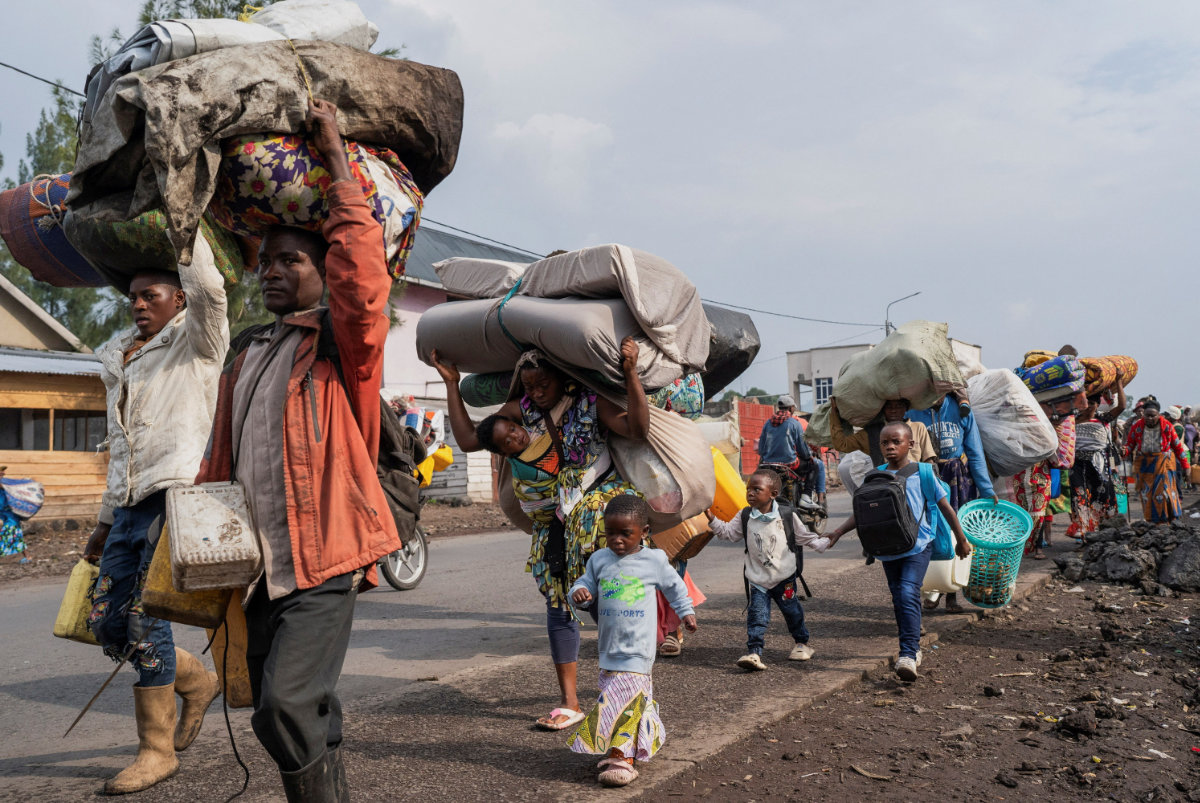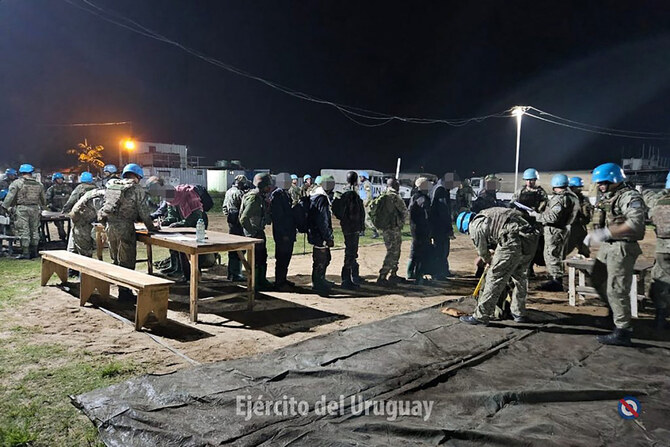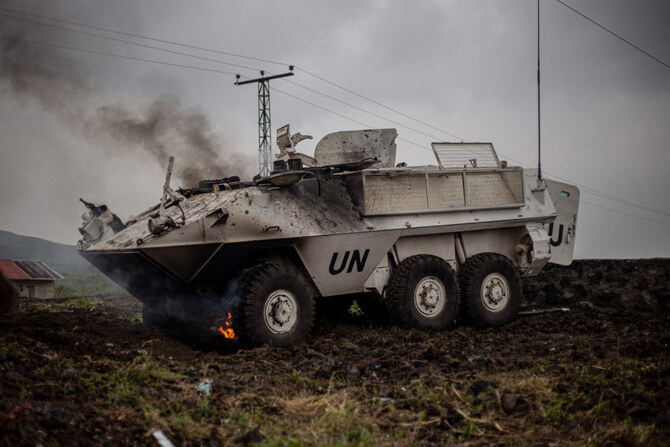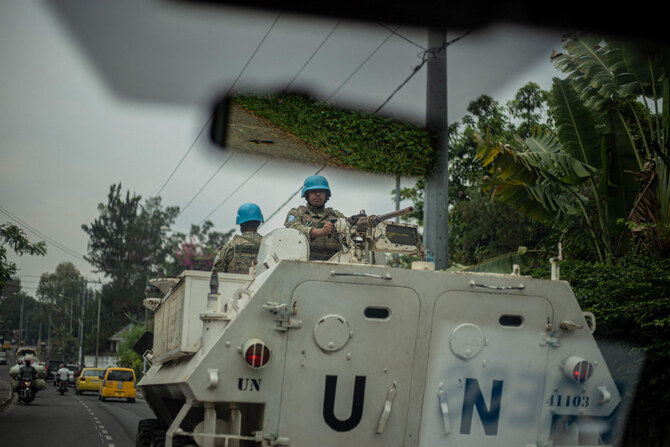UNITED NATIONS/GOMA, Congo: The UN Security Council on Sunday denounced the “flagrant disregard” for the sovereignty and territorial integrity of the Democratic Republic of Congo (DRC), demanding the withdrawal of “external forces” without explicitly naming them.
The Council “condemned the ongoing flagrant disregard for the sovereignty and territorial integrity of the DRC, including the unauthorized presence in the Eastern DRC of external forces as reported by the Group of Experts and demanded that these forces withdraw immediately,” it said in a statement Sunday evening, referencing a UN expert report that criticized the presence of Rwandan forces and their support for the M23 armed group fighting the Congolese army.
During an emergency meeting of the Security Council, UN‘s special representative for Congo said the attacking forces has caused “mass panic” in eastern Congo’s largest city, Goma, a humanitarian and security hub and home to 2 million people.
“M23 has declared the airspace over Goma closed,” UN special representative, Bintou Keita said. “In other words, we are trapped.”

Internally displaced civilians from the camps in Munigi and Kibati, carry their belongings as they flee following the fight between M23 rebels and DR Congo forces in Goma on January 26, 2025. (REUTERS)
Keita said M23 fighters were using residents “as human shields” as they advanced, while others fled for their lives.
The M23 rebels’ offensive at the heart of the mineral-rich region threatens to dramatically worsen one of Africa’s longest wars and create further misery for what is already one of the world’s largest humanitarian crises, with millions of people displaced.
‘Declaration of war’
Congo late Saturday broke off relations with Rwanda, which has denied backing the M23 despite evidence collected by UN experts and others. Congo’s government called it a “declaration of war.”
The surge of violence has killed at least 13 peacekeepers over the past week. And Congolese were again on the run.
The M23 has made significant territorial gains along Congo’s border with Rwanda in recent weeks, after months of regional attempts to make peace failed. On Sunday night, the rebels called on Congo’s army to surrender their arms and present themselves at a local stadium by 3 a.m. or they would take the city.
The Uruguayan army, who are in Goma serving with the UN peacekeeping mission, said in a statement on X late Sunday that some Congolese soldiers have laid down their weapons.
“More than a hundred FARDC soldiers are sheltered in the facilities of the “Siempre Presente” base awaiting the (Disarmament, Demobilization and Reintegration) process,” the statement said.
In photos shared with the statement, armed men are seen registering with the peacekeepers in a mix of military uniforms and civilian clothing.
Congo’s foreign minister, Thérèse Kayikwamba Wagner, told the Security Council that Rwanda was committing “a frontal aggression, a declaration of war which no longer hides itself behind diplomatic maneuvers.”
Rwanda’s ambassador to the UN, Ernest Rwamucyo, did not confirm or deny Congo’s claims. He blamed Congo’s government, saying the crisis could have been been averted if it had “demonstrated a genuine commitment to peace.”
US and France weigh in
The United States and France called for a ceasefire and appealed to Rwanda to withdraw its support to M23, with acting US Ambassador Dorothy Shea warning that the US would “consider all the tools at its disposal” to hold accountable those responsible for sustaining the armed conflict.
In the past 48 hours, two UN peacekeepers from South Africa and one from Uruguay were killed and 11 others were injured and hospitalized, UN Secretary-General Antonio Guterres’ spokesman said ahead of the Security Council meeting.
The UN chief reiterated his “strongest condemnation” of the M23 offensive “with the support of the Rwanda Defense Forces,” and called on the rebel group to immediately halt all hostile action and withdraw, spokesman Stephane Dujarric said.
Congo, the United States and UN experts accuse Rwanda of backing M23, which is mainly made up of ethnic Tutsis who broke away from the Congolese army more than a decade ago. It’s one of about 100 armed groups that have been vying for a foothold in the mineral-rich region, where a long-running conflict has created one of the world’s largest humanitarian crises.
Rwanda’s government denies backing the rebels, but last year acknowledged that it has troops and missile systems in eastern Congo to safeguard its security, pointing to a buildup of Congolese forces near the border. UN experts estimate up to 4,000 Rwandan forces are in Congo.
Congo’s foreign ministry said late Saturday it was severing diplomatic ties with Rwanda and pulling all diplomatic staff from the country “with immediate effect.”
Rwandan Foreign Minister Olivier Nduhungirehe told The Associated Press on Sunday that the decision to cut ties was a unilateral move by Congo.
“For us, we took appropriate measures to evacuate our remaining diplomat in Kinshasa, who was under permanent threat by Congolese officials,” Nduhungirehe said.
The M23 took Goma once before in 2012, withdrawing after considerable international pressure was put on Rwanda.
Civilians flee the rebel advance
On Sunday morning, heavy gunfire resonated across Goma, a few kilometers (miles) from the front line. Scores of children and adults fled the Kanyaruchinya camp, one of the largest in eastern Congo for displaced people, near the Rwandan border.
“We are fleeing because we saw soldiers on the border with Rwanda throwing bombs and shooting,” said Safi Shangwe, who was heading into the city.
Some of the displaced worried they would not be safe in Goma, either. “I heard that there are bombs in Goma, too, so now we don’t know where to go,” said Adèle Shimiye.
Hundreds of people attempted to flee to Rwanda. Migration officers at a border crossing east of Goma carefully checked travel documents.
“I am crossing to the other side to see if we will have a place of refuge because for the moment, security in the city is not guaranteed,” Goma resident Muahadi Amani told the AP.
UN deputy humanitarian chief Joyce Msuya said the situation was rapidly deteriorating. “If hostilities spill into Goma – a densely populated urban center – the impact on civilians could be devastating,” she said.
Congo’s army has said it was fending off the M23 offensive with the help of allied forces, including UN peacekeepers and soldiers from the Southern African Development Community Mission, also known as SAMIDRC.
In addition to the two South African peacekeepers, seven South African troops with SAMIDIRC have been killed in recent days, South Africa’s defense ministry said.
Since 2021, Congo’s government and allied forces — including the 14,000-strong UN mission — have been keeping M23 away from Goma.
Goma resident Bahati Jackson’s family has been hearing gunfire and remembers fleeing M23’s seizure of the city in 2012. But this time, they’re staying.
“If we’re going to die, it’s better to die here,” Jackson said.





























